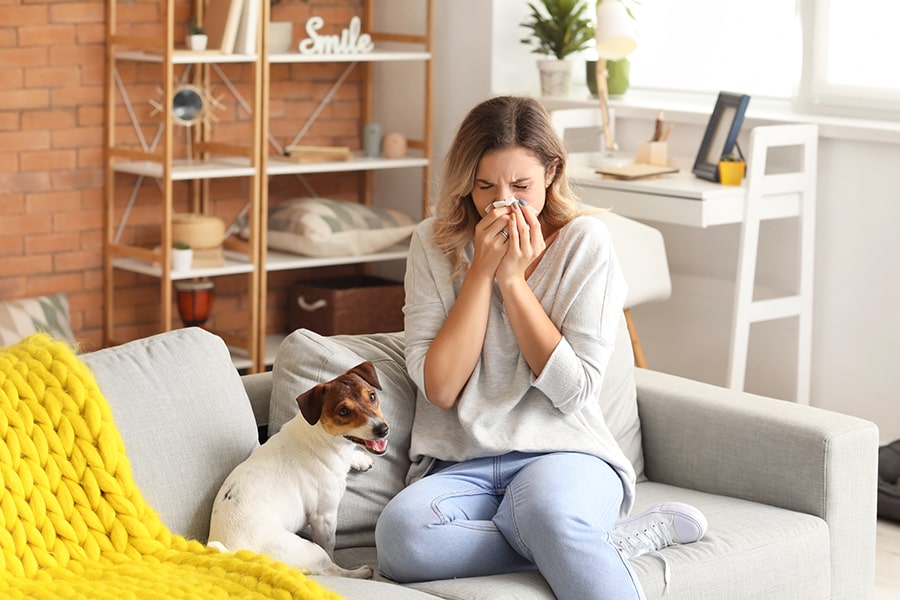 Pets bring joy, companionship, and comfort to millions of households. About 6 out of 10 U.S. households have a pet, including many families where someone is allergic to animals. While living with pets and allergies can be challenging, it’s not impossible. Learning how allergens affect the body and taking steps to minimize exposure can help pet owners manage symptoms while enjoying life with their pet companions.
Pets bring joy, companionship, and comfort to millions of households. About 6 out of 10 U.S. households have a pet, including many families where someone is allergic to animals. While living with pets and allergies can be challenging, it’s not impossible. Learning how allergens affect the body and taking steps to minimize exposure can help pet owners manage symptoms while enjoying life with their pet companions.
What Causes Pet Allergies?
Pet allergies are not caused by fur or feathers but by proteins found in pet dander (dead skin cells), saliva, and urine. If you experience sneezing, itchy eyes, or congestion after being around pets, dander is likely the culprit. It often collects in animal fur with other allergens like dust mites or pollen.
When these allergens enter your nose, eyes, or mouth, they can trigger allergy symptoms, including:
- Sneezing or nasal congestion
- Runny or stuffy nose
- Watery, red, or itchy eyes
- Skin rashes or hives
- Coughing or wheezing
- Asthma flare-ups
These symptoms can range from mild to severe and often worsen with prolonged exposure. People with asthma or other respiratory conditions may find that pet allergies exacerbate their symptoms, leading to increased breathing difficulties.
What is Pet Dander?
Pet dander refers to microscopic flakes of skin shed by animals with fur or feathers. These tiny particles are a primary source of allergens. Unlike fur or hair, which is visible, dander is so small and lightweight that it remains airborne for long periods, easily clinging to furniture, clothing, and other surfaces.
While cats and dogs are the most common sources of pet dander, other animals, such as rabbits, guinea pigs, and birds, can also produce allergens that trigger reactions. Even if dander is not always visible, it can still be present and cause symptoms, making proactive management essential. Despite common misconceptions, no breed of dog or cat is entirely hypoallergenic.
How to Manage Pet Allergies at Home
The most effective way to avoid pet dander allergens is to not have pets, but that’s not always a practical or desirable option. Fortunately, there are ways to minimize allergens and create a more comfortable environment for everyone in a home with pets.
Even those without pets at home can still be exposed to low levels of animal dander in public spaces like schools, workplaces, stores, and restaurants. If you’re dealing with pet dander, these practical tips can help reduce allergens in your home:
- Create Pet-Free Zones: Designate certain areas, like bedrooms, as pet-free spaces to reduce exposure where you spend the most time.
- Use HEPA Filters: Install HEPA air purifiers to trap airborne allergens and improve indoor air quality.
- Clean Regularly: Vacuum carpets, upholstery, and curtains frequently. Wash bedding, furniture covers, and other fabrics regularly.
- Bathe and Groom Pets: Bathe pets weekly and groom them outdoors whenever possible. Brush them in a closed-off area to limit dander in the air.
- Wash Your Hands: Always wash your hands after petting or handling pets to minimize allergen transfer.
Medical Treatments for Pet Allergies
When lifestyle changes aren’t enough to manage symptoms, medical treatments can provide relief. Allergen immunotherapy (allergy shots) can decrease one's sensitivity to animal dander and reduce reliance on medications.
There are also over-the-counter medications like antihistamines and decongestants to help control sneezing, runny nose, and nasal congestion. For persistent symptoms, prescription options such as nasal sprays and leukotriene modifiers may be recommended.
For individuals with asthma triggered by pet allergies, having an emergency inhaler is critical. An allergist can help determine the best combination of treatments based on your specific needs and severity of symptoms.
When to See a Richmond Allergy Doctor
If your symptoms persist despite your best efforts to manage them, it may be time to consult a specialist. Appropriate allergy testing can help ensure accurate diagnoses and effective treatment plans for managing allergies and asthma. Your journey to relief starts with a visit to your trusted Richmond Allergy specialist. Don't hesitate to reach out for help—call our office at 804-285-7420 to schedule an appointment.










